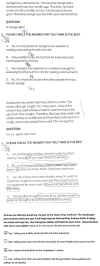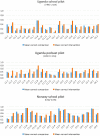Measuring ability to assess claims about treatment effects: the development of the 'Claim Evaluation Tools'
- PMID: 28515181
- PMCID: PMC5777467
- DOI: 10.1136/bmjopen-2016-013184
Measuring ability to assess claims about treatment effects: the development of the 'Claim Evaluation Tools'
Abstract
Objectives: To describe the development of the Claim Evaluation Tools, a set of flexible items to measure people's ability to assess claims about treatment effects.
Setting: Methodologists and members of the community (including children) in Uganda, Rwanda, Kenya, Norway, the UK and Australia.
Participants: In the iterative development of the items, we used purposeful sampling of people with training in research methodology, such as teachers of evidence-based medicine, as well as patients and members of the public from low-income and high-income countries. Development consisted of 4 processes: (1) determining the scope of the Claim Evaluation Tools and development of items; (2) expert item review and feedback (n=63); (3) cognitive interviews with children and adult end-users (n=109); and (4) piloting and administrative tests (n=956).
Results: The Claim Evaluation Tools database currently includes a battery of multiple-choice items. Each item begins with a scenario which is intended to be relevant across contexts, and which can be used for children (from age 10 and above), adult members of the public and health professionals. People with expertise in research methods judged the items to have face validity, and end-users judged them relevant and acceptable in their settings. In response to feedback from methodologists and end-users, we simplified some text, explained terms where needed, and redesigned formats and instructions.
Conclusions: The Claim Evaluation Tools database is a flexible resource from which researchers, teachers and others can design measurement instruments to meet their own requirements. These evaluation tools are being managed and made freely available for non-commercial use (on request) through Testing Treatments interactive (testingtreatments.org).
Trial registration numbers: PACTR201606001679337 and PACTR201606001676150; Pre-results.
Keywords: evidence based medicine; hared decision making; health literacy; multiple-choice; outcome measurement; patient education.
Published by the BMJ Publishing Group Limited. For permission to use (where not already granted under a licence) please go to http://www.bmj.com/company/products-services/rights-and-licensing/.
Conflict of interest statement
Competing interests: None declared.
Figures
Similar articles
-
Measuring ability to assess claims about treatment effects: a latent trait analysis of items from the 'Claim Evaluation Tools' database using Rasch modelling.BMJ Open. 2017 May 25;7(5):e013185. doi: 10.1136/bmjopen-2016-013185. BMJ Open. 2017. PMID: 28550019 Free PMC article.
-
Can an educational podcast improve the ability of parents of primary school children to assess the reliability of claims made about the benefits and harms of treatments: study protocol for a randomised controlled trial.Trials. 2017 Jan 21;18(1):31. doi: 10.1186/s13063-016-1745-y. Trials. 2017. PMID: 28109313 Free PMC article. Clinical Trial.
-
The effectiveness of internet-based e-learning on clinician behavior and patient outcomes: a systematic review protocol.JBI Database System Rev Implement Rep. 2015 Jan;13(1):52-64. doi: 10.11124/jbisrir-2015-1919. JBI Database System Rev Implement Rep. 2015. PMID: 26447007
-
Avoiding and identifying errors in health technology assessment models: qualitative study and methodological review.Health Technol Assess. 2010 May;14(25):iii-iv, ix-xii, 1-107. doi: 10.3310/hta14250. Health Technol Assess. 2010. PMID: 20501062 Review.
-
The participation of children and young people in decisions about UK service development.Child Care Health Dev. 2004 Nov;30(6):613-21. doi: 10.1111/j.1365-2214.2004.00470.x. Child Care Health Dev. 2004. PMID: 15527472 Review.
Cited by
-
Evaluating student's ability to assess treatment claims: validating a German version of the Claim Evaluation Tools.BMC Public Health. 2023 Feb 7;23(1):262. doi: 10.1186/s12889-022-14700-w. BMC Public Health. 2023. PMID: 36750778 Free PMC article.
-
Key concepts for informed health choices: Where's the evidence?F1000Res. 2023 Nov 27;11:890. doi: 10.12688/f1000research.123051.2. eCollection 2022. F1000Res. 2023. PMID: 37928808 Free PMC article.
-
Educational interventions to improve people's understanding of key concepts in assessing the effects of health interventions: a systematic review.Syst Rev. 2018 May 2;7(1):68. doi: 10.1186/s13643-018-0719-4. Syst Rev. 2018. PMID: 29716639 Free PMC article.
-
Measuring ability to assess claims about treatment effects: a latent trait analysis of items from the 'Claim Evaluation Tools' database using Rasch modelling.BMJ Open. 2017 May 25;7(5):e013185. doi: 10.1136/bmjopen-2016-013185. BMJ Open. 2017. PMID: 28550019 Free PMC article.
-
Comparison of the Informed Health Choices Key Concepts Framework to other frameworks relevant to teaching and learning how to think critically about health claims and choices: a systematic review.F1000Res. 2020 Mar 5;9:164. doi: 10.12688/f1000research.21858.1. eCollection 2020. F1000Res. 2020. PMID: 33224475 Free PMC article.
References
-
- Lewis M, Orrock P, Myers S. Uncritical reverence in CM reporting: assessing the scientific quality of Australian news media reports. Health Sociol Rev 2010;19:57–72. 10.5172/hesr.2010.19.1.057 - DOI
Publication types
MeSH terms
Associated data
LinkOut - more resources
Full Text Sources
Other Literature Sources




